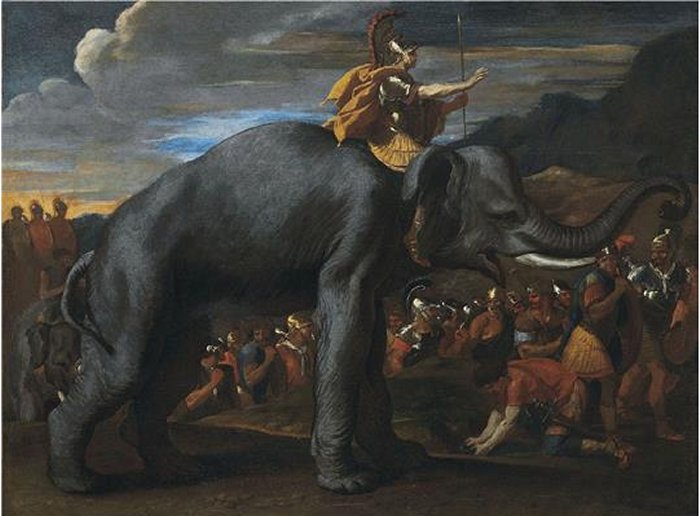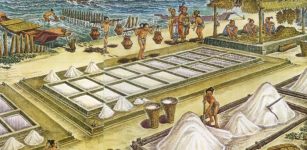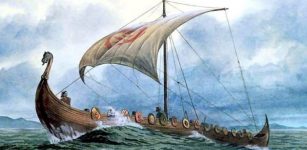Three Punic Wars Between Rome And Carthage Lasted Almost A Hundred Years
David Tee - AncientPages.com - When two influential and powerful nations collide, conflict and wars will occur. Carthage had ruled much of the Mediterranean through mercenary armies for about 600 years. Founded in the 9th century BC by the Phoenicians, Carthage had grown into a large, influential empire.
 Hannibal crossing the Alps. Nicolas Poussin
Hannibal crossing the Alps. Nicolas Poussin
On the other hand, Rome began expanding in both territory and influence in the same region. As Rome continued to grow, it was inevitable that the two empires would collide and come to blows. The first Punic War began in 264 BC.
Sicily Held By Both The Romans And The Carthaginians
Carthage’s presence on the island of Sicily rubbed Roman citizens the wrong way. The Romans and the Carthaginians held the island except for Syracuse, which was in the hands of Hiero II, the Greek Sicilian Tyrant of Syracuse (from 270 to 215 BC.)
In Hiero’s struggles against the Mamertines of Messina, the latter appealed to Rome and Carthage for aid. First, they went to the Carthaginians, and even though the leaders of Carthage agreed to help, the Mamertines also went to Rome for help.
This betrayal led to much tension between the old empire and the new upstart one. Once the war was declared, the two kingdoms fought long and hard. The prominent Carthaginian general was Hamilcar Barca, nicknamed for his lightning victories. No Roman general stood out at this time.
Most of the war was conducted through sea battles, which the Romans found a strategy that helped them win victory after victory over their more seasoned sea rivals. During this Punic War, Carthage was distracted by a rebellion by its mercenary army.
It is said that the Carthaginian leaders were corrupt and often failed to pay and supply their men. It led to a minor war, which saw Carthage lose its Italian territories in Corsica & Sardinia. In 226 BC, Carthage sued for peace, and the Spanish River Ebro was used as the territorial boundary.
The Second Punic War
In 218 BC, a Roman ally Saguntum City was conquered by Hannibal. The Romans complained and demanded the delivery of Hannibal Rome for punishment. The leaders of Carthage refused, and the second Punic War was started.
For obvious reasons, Hannibal, Hamilcar’s son, was a sworn enemy of Rome. When word reached him that Roman troops were marching toward his position, Hannibal made his infamous move over the Alps with his elephants.
He was a brilliant general and won every campaign against his Roman enemies. Yet, he could not extinguish them as Quintus Fabius Maximus took a more guerrilla military approach to try and starve his enemy.
After some counter-intelligence efforts on Hannibal’s part, Quintus Fabius Maximus was replaced by Caius Terentius Varro and Lucius Aemilius Paulus. The latter two decided to fight a direct battle against Hannibal, but he was too bright. He killed 44,000 Roman soldiers while losing only 6,000 himself.
Meanwhile, Publius Cornelius Scipio attacked the Carthaginian city of Utica. It forced the leaders of Carthage to recall Hannibal, but the war did not go well for him, and he convinced his leaders to make peace. In 184 BC, Hannibal killed himself because his corrupt leaders betrayed him to the Romans.
The Third Punic War
It lasted only three years in total, from 149 to 146 BC. It started with the Carthaginians, who felt they had paid their 2nd Punic war debt and tried to conquer Numidia. The Romans took offense at this action and demanded that Carthage be destroyed and rebuilt further inland.
Once the leaders of Carthage refused, the Romans declared war on Carthage. The Roman general Scipio Aemilianus wasted no time with battles. He immediately laid siege to the city. The siege eventually worked, but it took three years to defeat the Carthaginians.
Once Scipio entered the city, the Roman general burnt it for 17 days while selling off the 50,000 inhabitants into slavery. All of Carthage’s territories were taken over by the Romans and reshaped into an African province of Rome.
Written by – David Tee AncientPages.com Staff Writer
Updated on December 3, 2022
Copyright © AncientPages.com All rights reserved. This material may not be published, broadcast, rewritten or redistributed in whole or part without the express written permission of AncientPages.com
More From Ancient Pages
-
 Boomerangs Were Used To Shape Stone Tools By Aboriginal People
Archaeology | Aug 16, 2022
Boomerangs Were Used To Shape Stone Tools By Aboriginal People
Archaeology | Aug 16, 2022 -
 Bronze Age DNA Shows Direct Genetic Link To Current Inhabitants Of Southern Poland
Archaeology | May 4, 2020
Bronze Age DNA Shows Direct Genetic Link To Current Inhabitants Of Southern Poland
Archaeology | May 4, 2020 -
 Eye Of Ra – Powerful Ancient Egyptian Symbol With Deep Meaning
Ancient Symbols | Jan 23, 2019
Eye Of Ra – Powerful Ancient Egyptian Symbol With Deep Meaning
Ancient Symbols | Jan 23, 2019 -
 Salt Workers’ Residences At Underwater Maya Site – Identified
Archaeology | Nov 22, 2021
Salt Workers’ Residences At Underwater Maya Site – Identified
Archaeology | Nov 22, 2021 -
 Long Serpent: Most Famous Viking Longship Of King Olav Tryggvason Of Norway And Its Fate
Featured Stories | Jun 7, 2017
Long Serpent: Most Famous Viking Longship Of King Olav Tryggvason Of Norway And Its Fate
Featured Stories | Jun 7, 2017 -
 Rare Runic Inscriptions Engraved On Bone And Wood Discovered In Oslo, Norway
Archaeology | Feb 15, 2022
Rare Runic Inscriptions Engraved On Bone And Wood Discovered In Oslo, Norway
Archaeology | Feb 15, 2022 -
 Sedna: Inuit Goddess Sacrificed By Selfish Father Fearing For His Own Life
Featured Stories | Jan 7, 2020
Sedna: Inuit Goddess Sacrificed By Selfish Father Fearing For His Own Life
Featured Stories | Jan 7, 2020 -
 Valkyries Sigrdriva And Brynhildr: Brave Warriors Who Were Punished By God Odin In Norse And Germanic Mythology
Featured Stories | Apr 4, 2017
Valkyries Sigrdriva And Brynhildr: Brave Warriors Who Were Punished By God Odin In Norse And Germanic Mythology
Featured Stories | Apr 4, 2017 -
 Gruesome Discovery Of Headless Bodies In Vráble, Slovakia – Remains Of Stone Age Cult Victims Unearthed
Archaeology | Sep 24, 2022
Gruesome Discovery Of Headless Bodies In Vráble, Slovakia – Remains Of Stone Age Cult Victims Unearthed
Archaeology | Sep 24, 2022 -
 Oldest Preserved Remains Of Bed Bug Found In Paisley Caves, Oregon
Archaeology | Apr 7, 2017
Oldest Preserved Remains Of Bed Bug Found In Paisley Caves, Oregon
Archaeology | Apr 7, 2017 -
 On This Day In History: The Great Fire Of London – On July 10, 1212
News | Jul 10, 2016
On This Day In History: The Great Fire Of London – On July 10, 1212
News | Jul 10, 2016 -
 Is There A Hidden Ancient Message Inside San Miniato Al Monte Basilica?
Featured Stories | Oct 3, 2022
Is There A Hidden Ancient Message Inside San Miniato Al Monte Basilica?
Featured Stories | Oct 3, 2022 -
 Ancient 5,500-Year-Old Gate Was Discovered Recently At Tell Erani, Near The Kiryat Gat Industrial Zone, Israel
Archaeology | Aug 17, 2023
Ancient 5,500-Year-Old Gate Was Discovered Recently At Tell Erani, Near The Kiryat Gat Industrial Zone, Israel
Archaeology | Aug 17, 2023 -
 Selah – Mysterious Biblical Word Of Unknown Meaning
Biblical Mysteries | Jan 5, 2018
Selah – Mysterious Biblical Word Of Unknown Meaning
Biblical Mysteries | Jan 5, 2018 -
 Uniquely Well-Preserved Medieval Kitchen Unearthed North of Moravia
Archaeology | Aug 11, 2022
Uniquely Well-Preserved Medieval Kitchen Unearthed North of Moravia
Archaeology | Aug 11, 2022 -
 Almost Unknown Ancient Greek Text Rewrites History Of Poetry And Song
Archaeology | Sep 9, 2021
Almost Unknown Ancient Greek Text Rewrites History Of Poetry And Song
Archaeology | Sep 9, 2021 -
 19 Cannons Shot From British Ships During The American Revolution Discovered In Savannah River
Archaeology | Apr 29, 2022
19 Cannons Shot From British Ships During The American Revolution Discovered In Savannah River
Archaeology | Apr 29, 2022 -
 Lost World Of Doggerland: Parts Of Britain’s Sunken Stone Age Atlantis Discovered
Archaeology | Jul 4, 2012
Lost World Of Doggerland: Parts Of Britain’s Sunken Stone Age Atlantis Discovered
Archaeology | Jul 4, 2012 -
 Highly Debated Early Homo Erectus Skull From Turkana – Age And Origin Now Verified
Archaeology | Apr 20, 2021
Highly Debated Early Homo Erectus Skull From Turkana – Age And Origin Now Verified
Archaeology | Apr 20, 2021 -
 Mysterious Ancient Tomb May Contain Remains Of A Powerful Forgotten Goddess
Ancient Mysteries | Aug 30, 2018
Mysterious Ancient Tomb May Contain Remains Of A Powerful Forgotten Goddess
Ancient Mysteries | Aug 30, 2018

